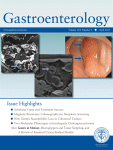Gastroenterology:黑猩猩试验表明TLR-7口服激动剂GS-9620或可治疗慢性乙型肝炎
2013-05-02 Gastroenterology 丁香园
对于慢性乙型肝炎的治疗来说,直接抗病毒药物能够抑制乙型肝炎病毒(HBV)载量,但需终生服用。相比之下,刺激先天免疫系统能提高机体对病毒的控制能力,而且在有限的治疗之后获得长期效应。因此,来自美国德克萨斯州圣安东尼奥市德州生物医学研究所病毒学与免疫学部门的ROBERT E. LANFORD等人展开一项研究,研究结果于2013年2月14日在线发表于《胃肠病学》(Gastroenterology)杂志上
对于慢性乙型肝炎的治疗来说,直接抗病毒药物能够抑制乙型肝炎病毒(HBV)载量,但需终生服用。相比之下,刺激先天免疫系统能提高机体对病毒的控制能力,而且在有限的治疗之后获得长期效应。因此,来自美国德克萨斯州圣安东尼奥市德州生物医学研究所病毒学与免疫学部门的ROBERT E. LANFORD等人展开一项研究,研究结果于2013年2月14日在线发表于《胃肠病学》(Gastroenterology)杂志上。作者发现,小分子化合物GS-9620能激活慢性感染HBV黑猩猩免疫细胞的Toll样受体7信号通路,从而诱导感染了HBV细胞的清除。
研究人员通过慢性感染HBV的黑猩猩来研究GS-9620——一种高效的口服Toll样受体7选择性小分子激动剂的免疫激活作用。在为期4周的时间里,每隔一天(每周3次)给予黑猩猩1 mg/kg剂量的GS-9620,停药1周之后,连续4周给予2 mg/kg剂量。他们测定了黑猩猩血浆和肝脏样本的病毒载量,GS-9260的药代动力学特征,以及以下药效动力学参数:干扰素刺激基因的表达、细胞因子和趋化因子的水平、淋巴细胞和自然杀伤细胞的激活,以及病毒抗原的表达。研究人员也通过监测临床病理学参数来判断GS-9620的安全性和耐受性。
研究结果如下:短期口服GS-9620能够实现对血浆和肝脏HBV DNA的长期抑制。病毒DNA最大降幅的均值为2.2 logs,出现于结束服用GS-9620后1周内,在数月时间里维持病毒DNA降幅>1 log。随着肝细胞凋亡的增加,血清HBV表面抗原水平、HBV e抗原水平,以及HBV抗原阳性的肝细胞数量均降低。服用GS-9620能诱导干扰素α及其他细胞因子和趋化因子的产生,激活干扰素刺激基因、自然杀伤细胞和淋巴细胞亚群。
研究发现,小分子化合物GS-9620能激活黑猩猩免疫细胞的Toll样受体7信号通路,从而诱导感染了HBV细胞的清除。未来或许可以将这一化合物开发成为治疗人类慢性HBV感染的药物。
与乙肝相关的拓展阅读:
- J Gastroenterology: 核苷类似物治疗乙肝的安全停药标志
- Hepatology:乙肝相关肝癌治疗靶点:癌基因YAP
- NAT GENET:STAT4和HLA-DQ基因可能是乙肝癌变关键基因
- Lancet:长期替诺福韦酯治疗可逆转慢乙肝肝硬化
- 乙肝母婴传播机制研究进展
- Hepatology:成人抗病毒药物对青少年乙肝也有效 更多信息请点击:有关乙肝更多资讯

GS-9620, an Oral Agonist of Toll-Like Receptor-7, Induces Prolonged Suppression of Hepatitis B Virus in Chronically Infected Chimpanzees
Background & Aims
Direct-acting antiviral agents suppress hepatitis B virus (HBV) load, but they require life-long use. Stimulation of the innate immune system could increase its ability to control the virus and have long-lasting effects after a finite regimen. We investigated the effects of immune activation with GS-9620—a potent and selective orally active small molecule agonist of Toll-like receptor 7—in chimpanzees with chronic HBV infection.
Methods
GS-9620 was administered to chimpanzees every other day (3 times each week) for 4 weeks at 1 mg/kg and, after a 1-week rest, for 4 weeks at 2 mg/kg. We measured viral load in plasma and liver samples, the pharmacokinetics of GS-9620, and the following pharmacodynamics parameters: interferon-stimulated gene expression, cytokine and chemokine levels, lymphocyte and natural killer cell activation, and viral antigen expression. Clinical pathology parameters were monitored to determine the safety and tolerability of GS-9620.
Results
Short-term oral administration of GS-9620 provided long-term suppression of serum and liver HBV DNA. The mean maximum reduction of viral DNA was 2.2 logs, which occurred within 1 week of the end of GS-9620 administration; reductions of >1 log persisted for months. Serum levels of HBV surface antigen and HBV e antigen, and numbers of HBV antigen–positive hepatocytes, were reduced as hepatocyte apoptosis increased. GS-9620 administration induced production of interferon-α and other cytokines and chemokines, and activated interferon-stimulated genes, natural killer cells, and lymphocyte subsets.
Conclusions
The small molecule GS-9620 activates Toll-like receptor 7 signaling in immune cells of chimpanzees to induce clearance of HBV-infected cells. This reagent might be developed for treatment of patients with chronic HBV infection.
本网站所有内容来源注明为“梅斯医学”或“MedSci原创”的文字、图片和音视频资料,版权均属于梅斯医学所有。非经授权,任何媒体、网站或个人不得转载,授权转载时须注明来源为“梅斯医学”。其它来源的文章系转载文章,或“梅斯号”自媒体发布的文章,仅系出于传递更多信息之目的,本站仅负责审核内容合规,其内容不代表本站立场,本站不负责内容的准确性和版权。如果存在侵权、或不希望被转载的媒体或个人可与我们联系,我们将立即进行删除处理。
在此留言







#TLR#
65
#Gastroenterol#
53
#乙型肝炎#
70
#TLR-7#
63
#黑猩猩试验#
58
#AST#
57
#黑猩猩#
84
#GAS#
65
#慢性乙型肝炎#
63
#Gastroenterology#
62